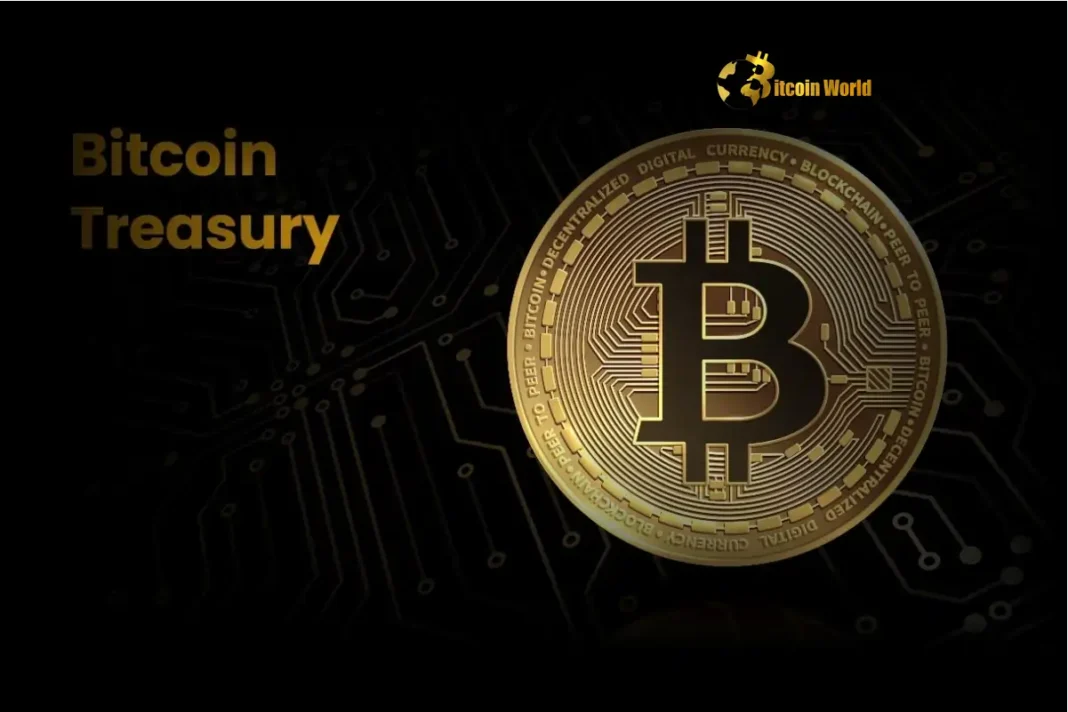Within the ever-evolving panorama the place conventional company governance meets the disruptive drive of digital belongings, a latest resolution by the US Securities and Alternate Fee (SEC) has caught the eye of each crypto lovers and company strategists. The core of the matter entails tech large Dell Applied sciences and a shareholder proposal regarding the potential inclusion of Bitcoin within the firm’s company treasury. This interplay highlights the continued debate about how public firms ought to method risky, non-traditional belongings like cryptocurrencies and the facility dynamics between firm administration and its shareholders.
What Occurred with Dell and the Shareholder Proposal?
The particular information revolves round a shareholder proposal submitted to Dell Applied sciences. This proposal urged the corporate’s board to think about including Bitcoin to its company treasury reserves. The concept behind such proposals typically stems from the idea that holding Bitcoin can function a hedge in opposition to inflation, a retailer of worth, or a method to sign innovation and entice funding from a brand new class of shareholders interested by digital belongings.
Nonetheless, Dell sought to exclude this proposal from its proxy supplies for the upcoming shareholder assembly. Represented by the legislation agency Hogan Lovells, Dell argued that the proposal fell beneath the class of strange enterprise operations, particularly issues associated to the corporate’s elementary enterprise choices concerning its belongings and investments. Underneath SEC guidelines (particularly Rule 14a-8), firms are usually allowed to exclude shareholder proposals that take care of issues referring to the corporate’s strange enterprise operations as a result of these are thought-about routine administration choices greatest left to the board and executives.
The SEC’s Stance: A “No-Motion” Letter
The essential growth is the SEC’s response. The regulatory physique issued a “no-action” letter to Dell. This implies the SEC workers indicated they might not advocate enforcement motion in opposition to Dell if the corporate proceeds to exclude the shareholder proposal from its proxy assertion. The SEC’s reasoning, as conveyed within the letter, aligns with Dell’s argument: the proposal touches upon choices associated to the corporate’s elementary enterprise operations and asset administration, that are thought-about routine administration issues.
It’s essential to grasp what a “no-action” letter signifies. It’s not a proper authorized ruling on the deserves of holding Bitcoin or the knowledge of the shareholder proposal itself. As a substitute, it’s a sign from the SEC workers that, based mostly on the data offered, they received’t pursue enforcement motion based mostly on the exclusion of the proposal beneath the precise rule cited (the strange enterprise exclusion).
Why is Managing the Company Treasury Thought-about “Routine Administration”?
At its core, an organization’s company treasury operate is liable for managing its monetary belongings, liquidity, and monetary dangers. This contains choices about the place to carry money, what short-term or long-term investments to make, managing debt, and hedging foreign money or rate of interest dangers. These choices require experience in monetary markets, threat evaluation, and alignment with the corporate’s total strategic objectives and monetary well being.
Right here’s why these are sometimes thought-about routine administration choices:
- Experience Required: Treasury administration entails complicated monetary methods and market data that common shareholders could not possess.
- Flexibility Wanted: Market circumstances change quickly. Administration wants the pliability to make well timed choices about asset allocation with no need a shareholder vote on each particular funding class.
- Alignment with Technique: Treasury choices should align with the corporate’s operational wants, capital expenditure plans, and total monetary technique, that are obligations of the administration group and board.
- Quantity of Selections: Corporations make quite a few monetary choices each day. Subjecting each particular funding option to a shareholder proposal course of could be impractical and burdensome.
The SEC’s settlement with Dell’s argument reinforces the long-standing precept that whereas shareholders have a proper to vote on vital issues (like mergers, board elections, or main coverage modifications), the day-to-day and strategic administration of the corporate’s funds, together with the precise belongings held in its company treasury, falls beneath the purview of the elected board and appointed executives.
What Does This SEC Determination Imply for Future Bitcoin Shareholder Proposals?
This resolution doesn’t essentially shut the door fully on shareholders influencing company crypto technique, but it surely does spotlight a big hurdle. It means that merely proposing that an organization *think about* or *maintain* a selected asset like Bitcoin in its company treasury is more likely to be considered by the SEC workers as an strange enterprise matter, making it excludable beneath Rule 14a-8.
Potential implications embrace:
- Reinforcement of Administration Management: The choice empowers administration groups to withstand shareholder stress on particular asset allocation selections inside the treasury.
- Greater Bar for Proposals: Shareholders interested by company crypto adoption may have to border their proposals in another way, maybe specializing in broader coverage points like disclosure of crypto publicity, the event of a digital asset technique framework, or linking govt compensation to digital asset innovation, somewhat than mandating particular treasury holdings.
- Concentrate on Dialogue: This final result may push shareholders in the direction of direct engagement and dialogue with firm administration and the board exterior the formal shareholder proposal course of to advocate for Bitcoin adoption or exploration.
- Consistency with Previous Rulings: The SEC’s stance right here is essentially in keeping with the way it has handled different proposals searching for to dictate particular funding choices or asset allocations inside an organization’s portfolio or treasury.
Why Are Shareholders Pushing for Company Bitcoin Holdings? (Advantages)
The drive for firms to carry Bitcoin of their company treasury isn’t random. Proponents level to a number of potential advantages:
- Inflation Hedge: In an period of quantitative easing and rising inflation issues, Bitcoin’s mounted provide is seen by many as a possible hedge in opposition to the devaluation of fiat currencies.
- Retailer of Worth: Usually dubbed “digital gold,” Bitcoin is considered as a possible long-term retailer of worth, particularly amongst youthful demographics.
- Innovation Sign: Holding Bitcoin can sign that an organization is forward-thinking and embracing technological innovation, doubtlessly interesting to tech-savvy traders and clients.
- Stability Sheet Diversification: Whereas risky, Bitcoin affords diversification away from conventional money and monetary devices, which can yield low returns in a low-interest-rate setting.
- Potential Appreciation: The hope for vital value appreciation is a transparent motivator, doubtlessly boosting the corporate’s steadiness sheet.
- Attracting Expertise & Funding: Being related to the crypto area could make an organization extra enticing to expertise and traders within the sector.
What Makes Corporations Hesitant? (Challenges)
Regardless of the potential upsides, there are vital challenges and dangers that make firms like Dell cautious about holding Bitcoin:
- Value Volatility: Bitcoin’s value is notoriously risky. Massive swings can considerably impression an organization’s quarterly earnings report resulting from accounting guidelines (typically requiring impairment prices when the value drops).
- Regulatory Uncertainty: The regulatory panorama for cryptocurrencies continues to be creating globally. Future laws might impression custody, accounting, taxation, and even the legality of holding such belongings.
- Accounting Complexities: Underneath present accounting requirements (like US GAAP), Bitcoin is usually handled as an intangible asset. This requires particular accounting remedy, together with potential impairment prices, which might introduce volatility to monetary statements.
- Safety Dangers: Storing vital quantities of Bitcoin requires sturdy safety measures to guard in opposition to hacking, theft, or lack of personal keys. This necessitates specialised experience and infrastructure.
- ESG Issues: The vitality consumption related to Bitcoin mining raises environmental, social, and governance (ESG) issues for firms centered on sustainability.
- Lack of Experience: Many conventional company treasury groups lack the experience required to handle, safe, and account for digital belongings like Bitcoin.
- Public Notion & Fame: Associating the corporate with the risky and typically controversial crypto market might impression its model and popularity.
Examples of Corporations That Do Maintain Bitcoin
Whereas Dell is selecting to not pursue this path based mostly on the SEC’s allowance to exclude the proposal, it’s price noting that some public firms have proactively added Bitcoin to their steadiness sheets. Probably the most distinguished instance is MicroStrategy, led by Michael Saylor, which holds a big quantity of Bitcoin and has made it a core a part of its company technique. Different notable examples embrace Tesla (although they’ve purchased and offered some) and Block (previously Sq.), led by Jack Dorsey.
These firms typically cite causes aligned with the potential advantages talked about earlier, akin to a hedge in opposition to inflation and a perception within the long-term worth of Bitcoin as a digital asset.
The Way forward for Company Treasury and Digital Property
The interplay between Dell, its shareholder proposal, and the SEC highlights that the query of incorporating digital belongings into conventional finance is way from settled. Whereas the SEC’s resolution reinforces current guidelines in regards to the scope of shareholder proposals, it doesn’t diminish the rising curiosity in Bitcoin and different digital belongings as potential parts of a diversified company treasury technique.
Because the regulatory setting matures and institutional adoption of digital belongings doubtlessly will increase, extra firms could discover holding crypto. Nonetheless, choices will possible stay firmly inside the area of administration and the board, fastidiously weighing the potential advantages in opposition to the numerous dangers and complexities concerned.
Actionable Insights for Shareholders and Corporations
For shareholders who imagine in company Bitcoin adoption, this SEC resolution signifies that direct mandates on particular asset holdings are tough to push via through the shareholder proposal mechanism. Methods may have to shift in the direction of:
- Partaking instantly with administration and the board to teach and advocate.
- Specializing in proposals associated to threat disclosure round digital belongings or the event of a proper digital asset technique.
- Investing in firms which have already publicly embraced Bitcoin or different digital belongings.
For firms, the takeaway is evident: be ready for questions and potential proposals concerning digital belongings. Having a well-defined stance and technique (even when that technique is to keep away from holding crypto) for managing the company treasury within the context of evolving digital finance is turning into more and more essential.
Conclusion: Routine Determination, Important Debate
The SEC’s resolution to permit Dell to exclude the shareholder proposal on holding Bitcoin underscores the regulatory physique’s view that particular asset allocation inside an organization’s company treasury falls beneath the umbrella of routine administration choices. Whereas this can be disappointing for proponents of company crypto adoption through shareholder activism, it’s in keeping with established company governance ideas.
This occasion doesn’t symbolize a judgment from the SEC on Bitcoin itself, however somewhat on the procedural validity of the shareholder proposal beneath current guidelines. The broader debate about whether or not, when, and the way firms ought to incorporate Bitcoin and different digital belongings into their monetary methods will undoubtedly proceed, pushed by market dynamics, evolving laws, and the strategic selections of forward-thinking management groups.
To study extra in regards to the newest Bitcoin and SEC traits, discover our articles on key developments shaping company treasury methods and shareholder proposals within the digital asset area.

